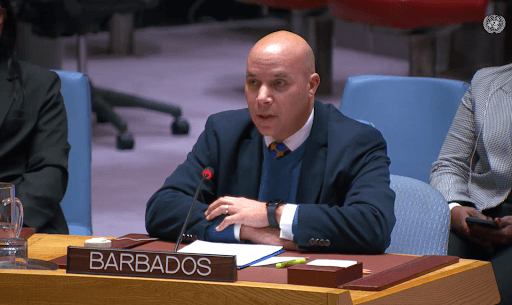Ambassador and Permanent Representative of Barbados to the United Nations, World Trade Organization and other International Organizations in Geneva, Matthew Wilson, has made a plea for the issues of global debt and health systems to be addressed.
He made the call during his keynote address at the ninth annual Health 20 Summit, held at the World Health Organization, in Geneva, on June 20.
The event, which focused on ‘Rebuilding Public Trust for Global Health: Coming Together for SDG30’, is one of the most respected health events on the global agenda, feeding directly into policymakers at the G7 and the G20.
Ambassador Wilson shared that non-communicable diseases (NCDs) have been affecting small island developing states (SIDS), and based on a number of alarming statistics, they had some of the highest rates of NCDs, and are also among the most vulnerable to the effects of climate change.
He cautioned: “Over half of deaths in SIDS are premature and from NCDs, including cardiovascular diseases, cancer, diabetes, chronic respiratory diseases, and mental health conditions, and global diabetes rates have doubled over the last 30 years with middle-and low-income countries suffering the most.”
In addition, Ambassador Wilson noted that the highest prevalence of diabetes among adults in the world is also projected to be in SIDS, with diabetes in the Caribbean doubling the global average. He further stated that “rates of mental health conditions reach as high as 15 per cent in the Caribbean and the Pacific, where, given some SIDS still criminalise suicide, there is a need for updating of health legislation in line with human rights norms, including the decriminalisation of suicide”.
He reminded the gathering that Barbados hosted the SIDS Summit on NCDs, Climate Change and Mental Health in 2023 and has been undertaking several health and policy related initiatives to address the prevalence of NCDs.
However, the Ambassador indicated that many external factors are affecting the ability of governments in SIDS to confront the NCD crisis alone and noted that the NCD epidemic grew faster in SIDS than elsewhere, partly due to commercial influence and trade challenges that can undermine access to fresh and nutritious foods.
He shared a recent study on the impact of the recent tariff escalation that showed supermarket prices were likely to rise across the board by 2.8 per cent, with higher increases for fresh produce. “This is not good news for countries that are already food insecure and who import almost all of their food,” he stated.
The Ambassador called on the G7 and G20 to look closer at debt and debt relief as it relates to global health and highlighted that 40 per cent of the world lives in places that spend more money paying interest on their debts than on health or education.
“We will not solve the health and NCD crisis unless we free up the resources to do this. We need to address these inconsistencies. Hence, addressing debt has to be a key pillar, including if we are going to look at building health systems and engaging in prevention, screening and early detection,” Ambassador Wilson stressed.





